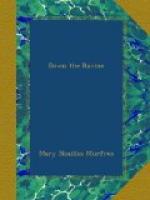A lie seemed less reprehensible when he was obliged to labor so conscientiously to make it heard.
And then compunction seized him. He sat down by Tennessee on a pile of bark, and took off his old wool hat to mop the cold perspiration that had started on his head and face. He felt sick, and sad, and extremely wicked,—a sorry contrast to Birt, who was so honest and reliable and, as his mother always said, “ez stiddy ez the mounting.” Birt was beginning to unharness the mule, for the day’s work was at an end.
The dusk had deepened to darkness. The woods were full of gloom. A timorous star palpitated in the sky. In the sudden stillness when the bark-mill ceased its whir, the mountain torrent hard by lifted a mystic chant. The drone of the katydid vibrated in the laurel, and the shrill-voiced cricket chirped. Two of the men were in the shed examining a green hide by the light of a perforated tin lantern, that seemed to spill the rays in glinting white rills. As they flickered across the pile of bark where Rufe and Tennessee were sitting, he noticed how alert Birt looked, how bright his eyes were.
For Birt’s hopes were suddenly renewed. He thought that some mischance had detained Nate to-day, and that he would come to-morrow to work at the bark-mill.
The boy’s blood tingled at the prospect of being free to seek for treasure down the ravine. He began to feel that he had been too quick to distrust his friend. Perhaps the stipulation that Nate should not go to the ravine until the work commenced was more than he ought to have asked. And perhaps, too, the trespasser was not Nate! The traces of shallow delving might have been left by another hand. Birt paused reflectively in unharnessing the mule. He stood with the gear in one hand, serious and anxious, in view of the possibility that this discovery was not his alone.
Then he strove to cast aside the thought. He said to himself that he had been hasty in concluding that the slight excavation argued human presence in that lonely spot; a rock dislodged and rolling heavily down the gorge might have thus scraped into the sand and gravel; or perhaps some burrowing animal, prospecting for winter quarters, had begun to dig a hole under the bowlder.
He was perplexed, despite his plausible reasoning, and he continued silent and preoccupied when he lifted Tennessee to his shoulder and trudged off homeward, with Rufe at his heels, and the small boy’s conscience following sturdily in the rear.
That sternly accusing conscience! Rufe was dismayed, when he sat with the other laughing children about the table, to know that his soul was not merry. Sometimes a sombre shadow fell upon his face, and once Birt asked him what was the matter. And though he laughed more than ever, he felt it was very hard to be gay without the subtle essence of mirth. That lie!—it seemed to grow; before supper was over it was as big as the warping-bars, and when they all sat in a semicircle in the open passage, Rufe felt that his conscience was the most prominent member of the party. The young moon sank; the night waxed darker still; the woods murmured mysteriously. And he was glad enough at last to be sent to bed, where after so long a time sleep found him.




